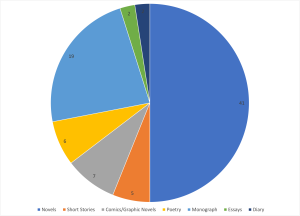Getting this one in just under the wire, so that I will have fulfilled my resolution to write at least one post a month. I know it’s not an original sentiment, but this has been a weird year— one in which time has seemed especially elastic. 2021 went by very fast, but at the same time events from early in the year seem like they must have happened 3 years ago. I don’t really have any idea what one could say to wrap up a year like that; even more than usual, it defies summary. At the same time, though, I have to say that best-of lists are one of my favorite things about the end of the year. Yes, they can seem arbitrary; yes, they both leave out good things out and over-praise others. But I think trying to stop and take stock of the year, in some sense, is a useful exercise, as long as you view it as an exercise— a way to initiate conversations rather than foreclose them. So, here are a couple of good articles that have nothing to do with the end of the year, and a couple of the lists I found most interesting.
“The American Addition to Speeding,” by Henry Grabar, is about how dysfunctional speed limit laws are in the United States.
The speed limit is alternately too low on interstate highways, giving police discretion to make stops at will, and too high on local roads, creating carnage on neighborhood streets. Enforcement is both inadequate and punitive. The cost is enormous. And the lack of political will to do something about it tracks with George Carlin’s famous observation that everybody going faster than you is a maniac and everybody going slower than you is an idiot.
Speeding is definitely dangerous; Grabar points out that “speeding a factor in nearly 10,000 deaths each year, in addition to an unknowable number of injuries. Thousands of car crash victims are on foot, and speed is an even more crucial determinant of whether they live or die…” At the same time, speed limits around the country have risen since 1995, when the federal law mandating a speed limit of 55 mph was repealed— recently reaching 80 mph in some places in Texas— and fatalities have actually gone down. Part of that is safer cars, but mainly it shows that predicting what will happen when tens of millions of people of different levels of awareness and ability are driving different distances on different roads in different conditions for different reasons is not simple. Also, speeding seems to follow a power law distribution— that is, a small number of people cause most of the problem, with people who drive more than 20 miles per hour over the limit being dramatically more likely to have an accident, and to kill or seriously injure someone when they do. That’s not surprising, but it means that pulling over a bunch of people who are going five miles per hour over the limit won’t do much to make roads safer. Interestingly, the most effective thing seems to be automatic speed cameras, which not only catch more speeding but, at least in theory, do it without racial or other bias and cost less money. But a very vocal minority absolutely hates them, and they have managed to limit their use in the U.S. That’s one example of the ways in which speed laws have, perhaps inevitably, become part of our partisan culture wars— a development that almost entirely precludes any rational solution.
“China’s Troll King,” by Han Zhang, discusses the rise of Hu Xijin, editor of China’s Global Times. Hu has made his name as the face of a bellicose Chinese nationalism that rejects any criticism of Chinese policy as an attempt to prevent China from achieving its global destiny, and he’s helped to inspire a large number of so-called “Wolf Warriors…who promote a “China first” philosophy and use social media to trash anyone they see as opposing Chinese interests.” The things he says sound a lot like what Vladimir Putin says about Russia and its critics (and, increasingly, that Fox News says about the United States and ours), and his views have been pushed into the mainstream by the fact that they mesh well with Xi Jinping’s— which is to say, Hu is part of China’s state propaganda machine, but he has an informal, slightly profane, social media-friendly style that means he doesn’t sound like he’s just parroting the party line.
Perhaps predictably, the stance and style that Hu helped to popularize may be starting to pass him by; he’s faced criticism from the right for being too “soft” on rivals like India. “A decade ago, on social media, Hu had seemed to be the No 1 flag bearer for Chinese nationalism. Now his status is not so certain. On Weibo, while Hu was being criticised for insufficient national pride…”
Every year, Tom Whitwell posts a list of “52 Things I Learned This Year,” and it is always fascinating. It’s a mix of fun facts— e.g., that the battery in the new electric Hummer will weigh as much as an original Land Rover, or that the clean rooms in which semiconductors are produced must be a thousand times cleaner than an operating room, because transistors are now much smaller than viruses— and links to more in-depth stuff— like this totally enthralling article about how some of the ashes of the Mexican architect Luis Barragan were made into a diamond by artist Jill Magid. (Why, you ask? To try to persuade the a Swiss banking family to ease the tight controls they impose on his archives, obviously). I could keep giving examples, but I’d some point I’d just be reproducing his list.
I really liked looking at both Film Comment’s Best Films of 2021 and A Closer Listen’s Top 20 Albums of the Year, because both have so little overlap with other best-of lists.
Janelle Shane’s most recent AI Weirdness newsletter features a list of AI-generated New Year’s resolutions, and they are amazing. Again, you really need to see the whole thing, but a couple of my favorites include:
- Ride out of town holding a pelican.
- Put on a red shirt and scream ‘I’M NOT WEARING PANTS!’ every time I leave the house.
- I will from now on tell every dog I meet that I am training to be a dragon.
- Wear a dinosaur costume to every public event I attend.
Finally, and more generally, you should sign up for Robin Sloan’s newsletter(s). (He’s got several, on different topics). Sloan is the author of the novels Mr. Penumbra’s 24-Hour Bookstore and Sourdough, which are both very good, but he’s also extremely good at aggregating interesting online things (I aspire to do this at his level), and he also seems like a really nice, thoughtful person.
Happy New Year. May 2022— a year that still makes me feel like I’m starting my sci-fi novel every time I write it—be a better one.


